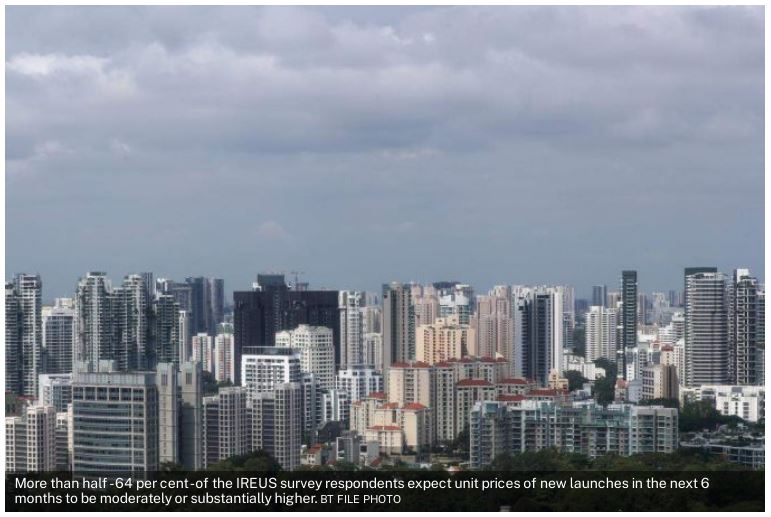Singapore property players turn cautious as economic outlook darkens
PROPERTY players are more cautious about market outlook in the next 6 months to a year ahead in anticipation of various global economic uncertainties, according to a survey by the National University of Singapore’s Institute of Real Estate and Urban Studies (IREUS).
Nearly 97 per cent of its respondents flagged rising inflation or interest rates as the top potential risk factor which may adversely impact market sentiment in the next half year, according to the Real Estate Sentiment Index (RESI) survey. About 8 in 10 respondents also indicated “a decline in the global economy” and “tightening of financing and liquidity in the debt market” as potential risks.
Worries over rising costs of construction softened from 94.9 per cent in Q1 to 80 per cent in Q2, but it still remains in the top 4 risks. Meanwhile, there was growing concern over “the real estate bubble or excessive speculative activities” and “job losses or decline in the domestic economy”, each getting about 16.7 per cent and 36.7 per cent votes respectively.
An unnamed respondent said: “Developers will want to launch quickly while sentiments are positive and before interest rates run up further. With high land prices and higher construction costs, pricing for new projects are expected to be moderately higher in this resilient market. But developers have to price them attractively since interest rates and inflation have risen and that may impact buyers’ affordability.”
Looking forward, more than half – 64 per cent – of the survey respondents expect unit prices of new launches in the next 6 months to be moderately or substantially higher. About 31 per cent expected new launch prices to maintain at the same price level, while only 6.3 per cent expected prices to be substantially lower.
About 44 per cent expect more units to be launched, while another 44 per cent expect the launch volumes in the next 6 months to be about the same.
IREUS’ real estate sentiment index survey included responses from developers, consultants, financial institutions, professional firms, and service providers. Its composite sentiment index, a derived indicator for overall real estate market sentiment, fell to 5.7 in Q2 from 6.1 in Q1. The decline was likely triggered by rising global economic uncertainty, IREUS said.
In response to the Urban Redevelopment Authority’s Long-Term Plan Review – which includes plans to introduce commercial sites with shorter leases and transform the Central Business District (CBD) into a “live, work and play” environment – launched last month, the institute also interviewed 30 real estate senior executives. About 70 per cent showed more interest in residential developments in upcoming economic nodes, while about 56.7 per cent indicated greater interest for mixed-use developments outside the CBD.
At the other end of the spectrum, 43.3 per cent indicated lower interest among developers in commercial sites with shorter leases. Only 16.7 per cent of respondents indicated that there would be higher developer interest.
Nearly half believed that mixed-use developments comprising hotel, residential, retail and office space would help enliven the CBD, while 33 expected mixed-use developments with hotel, residential and retail components to promote vibrancy.
However, only a few felt that office-led mixed configurations would contribute to a vibrant CBD. Most respondents also believed that professional talent would still prefer to locate and work in the Core Central Region.
“Some respondents highlighted that zoning regulations should be more flexible and allow developers more free-play to interchange uses during development and post-development. This will allow the landlords to be more nimble and change quickly to meet new needs. Other developers felt that more incentives, such as higher GFA bonuses, are needed to offset the costs of innovation and sustainability initiatives and nudge landlords towards such value-added activities,” IREUS reported.
Source: https://www.businesstimes.com.sg/real-estate/singapore-property-players-turn-cautious-as-economic-outlook-darkens


 Thailand
Thailand




